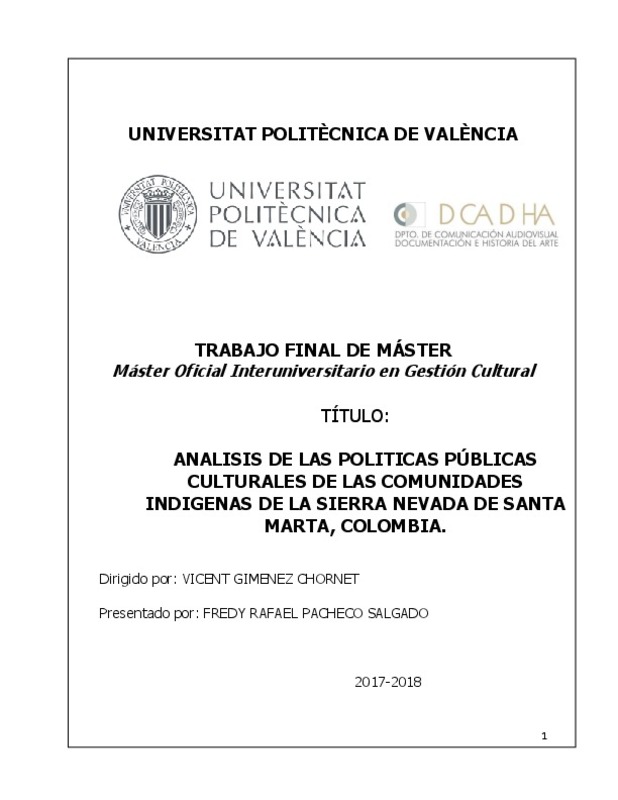|
Resumen:
|
Colombia es un país reconocido por su rica diversidad cultural que se expresa en una gran pluralidad de identidades y de expresiones culturales de los pueblos y comunidades que conforman la nación. En Colombia existen 87 ...[+]
Colombia es un país reconocido por su rica diversidad cultural que se expresa en una gran pluralidad de identidades y de expresiones culturales de los pueblos y comunidades que conforman la nación. En Colombia existen 87 pueblos indígenas distribuidos en 700 resguardos, con lenguas y cosmivisiones culturales distintas y que cuentan con propio territorio y autonomia para diseñar las políticas y los planes y programas de desarrollo económico, cultural y social dentro de su territorio, en armonía con el plan de desarrollo nacional.
La presente investigación tiene como como objetivo analizar cómo se diseñan e implementan las políticas públicas culturales al interior de las comunidades indígenas objeto de estudio, con el fin conocer su alcance en la preservación de las culturas autóctonas y sus aportes normativos a la construcción y conservación del patrimonio cultural de la nación.
Dada la normatividad general nacional e internacional que existe y la normatividad especial para comunidades indígenas , como objetivo específico se plantea determinar un marco normativo nacional e internacional que permita la implementación de políticas públicas culturales que brinden una mayor protección e interacción de expresiones e identidades culturales diversas con miras al fortalecimiento de la interculturalidad y generando la conservación y buen uso del patrimonio material e inmaterial de acuerdo a los convenios internacionales de protección a la cultura.
Reconociendo la cosmovisión y los diálogos culturales entre las distintas comunidades indígenas que habitan el caribe colombiano, es importante indagar como hacer efectivo que sus tradiciones se consagren y conserven, por lo cual el presente trabajo de investigación pretende analizar las actuales estrategias implementadas para la elaboración de las políticas públicas culturales y su impacto en las 10 comunidades indígenas que habitan el caribe colombiano. Por último, se concluirá con una serie de recomendaciones como lineamientos estratégicos con el fin de lograr políticas públicas culturales eficaces que beneficien el patrimonio cultural material e inmaterial de las comunidades indígenas.
[-]
Colombia is a country recognized for cultural diversity that is expressed in a large plurality of identities and cultural expressions of the peoples and communities that make up the nation.
In Colombia, there are 87 ...[+]
Colombia is a country recognized for cultural diversity that is expressed in a large plurality of identities and cultural expressions of the peoples and communities that make up the nation.
In Colombia, there are 87 indigenous peoples distributed in 700 resguardos, with different languages and cosmivisiones cultural, who have their own territory and autonomy to design policies and plans and programs of economic, cultural and social development within their territory, in harmony with the national development plan
The present research aims to analyze how to design and implement public cultural policies within the indigenous communities under study, in order to know their scope in the conservation of indigenous cultures and their normative contributions for the construction and conservation of cultural heritage of the nation.
Given the general national and international regulations that exist and the special regulations for indigenous communities, a specific objective is a national and international normative framework that allows the implementation of public policies that seek greater protection and the interaction of expressions and cultural identities with aimed at strengthening interculturalism and generating the conservation and good use of material and material heritage in accordance with international conventions for the protection of culture.
Recognizing the cosmovision and cultural dialogues in the diverse communities that inhabit the Colombian Caribbean, it is important to investigate how to make implement that their traditions are consecrated and conserved, for which the present research work tries to analyze the current strategies implemented for the elaboration of cultural public policies and their impact on the 10 indigenous communities inhabiting the Colombian Caribbean
Finally, it concludes with a series of recommendations as strategic guidelines in order to achieve cultural cultural policies that benefit the cultural and immaterial material heritage of indigenous communities.
[-]
|







